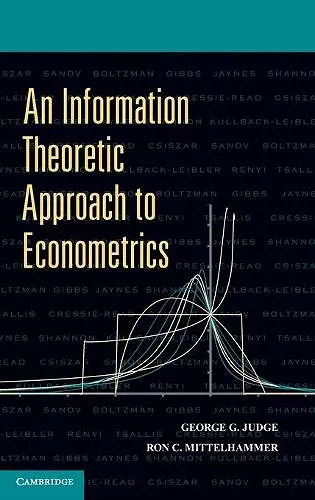An Information Theoretic Approach to Econometrics
George G Judge author Ron C Mittelhammer author
Format:Hardback
Publisher:Cambridge University Press
Published:12th Dec '11
Currently unavailable, and unfortunately no date known when it will be back

Most econometric books do not recognize the ill-posed inverse nature of their econometric models and the indirect noisy characteristics of their sample data. This book focuses on these problems and provides a basis for dealing with estimation and inference issues that typically arise in a range of traditional and nontraditional econometric models.This book is intended to provide the reader with a firm conceptual and empirical understanding of basic information-theoretic econometric models and methods. Because most data are observational, practitioners work with indirect noisy observations and ill-posed econometric models in the form of stochastic inverse problems. Consequently, traditional econometric methods in many cases are not applicable for answering many of the quantitative questions that analysts wish to ask. After initial chapters deal with parametric and semiparametric linear probability models, the focus turns to solving nonparametric stochastic inverse problems. In succeeding chapters, a family of power divergence measure-likelihood functions are introduced for a range of traditional and nontraditional econometric-model problems. Finally, within either an empirical maximum likelihood or loss context, Ron C. Mittelhammer and George G. Judge suggest a basis for choosing a member of the divergence family.
'Taking us beyond traditional econometric estimation and inference, this landmark text leads us carefully through the modern literature on empirical likelihood methods to an extremely compelling new methodology. The authors present a clear and compelling case for recognizing econometric problems for what they really are - namely, ill-posed noisy inverse problems. By showing how very general information-theoretic methods can be used in a natural way to solve such problems, Judge and Mittelhammer break new ground and set a new standard for the econometric community.' David Giles, University of Victoria, Canada
'This beautifully written book pushes the frontiers of econometrics in three ways. First, it provides a clear connection between the more traditional econometric and information-theoretic estimation methods. Second, it provides a detailed state of the art presentation of information-theoretic methods within econometrics. Third, it illustrates the wide applicability of information-theoretic methods for learning from data. The book is a great resource for graduate students and researchers at all levels. The authors - two of the leading econometricians and experts in information-theoretic methods - are to be congratulated.' Amos Golan, Info-Metrics Institute, American University
'Judge and Mittelhammer masterfully demonstrate the power of the information divergence-based approach to econometric information recovery, and expand it in new directions. Clarity of exposition, typical for the authors, makes this research monograph highly accessible to both researchers and students of econometrics.' Marian Grendár, Matej Bel University, Slovakia
'This book, written by two outstanding experts in the field, will be a valuable resource for empirical and theoretical researchers interested in the topic of information-theoretic econometric methods.' Patrik Guggenberger, University of California, San Diego
'This is a definitive book: Judge and Mittelhammer are legendary architects of modern information econometrics. It provides both a practical exposition to the subject matter, as well as an extremely thorough presentation of the underlying statistical analysis of information theory and empirical likelihood applied to econometrics models. I highly recommend this book, which will be widely read, referenced, and used by students, instructors and researchers in the areas of econometrics, economics, statistics and other applied sciences.' Aman Ullah, University of California, Riverside
ISBN: 9780521869591
Dimensions: 235mm x 155mm x 18mm
Weight: 460g
248 pages